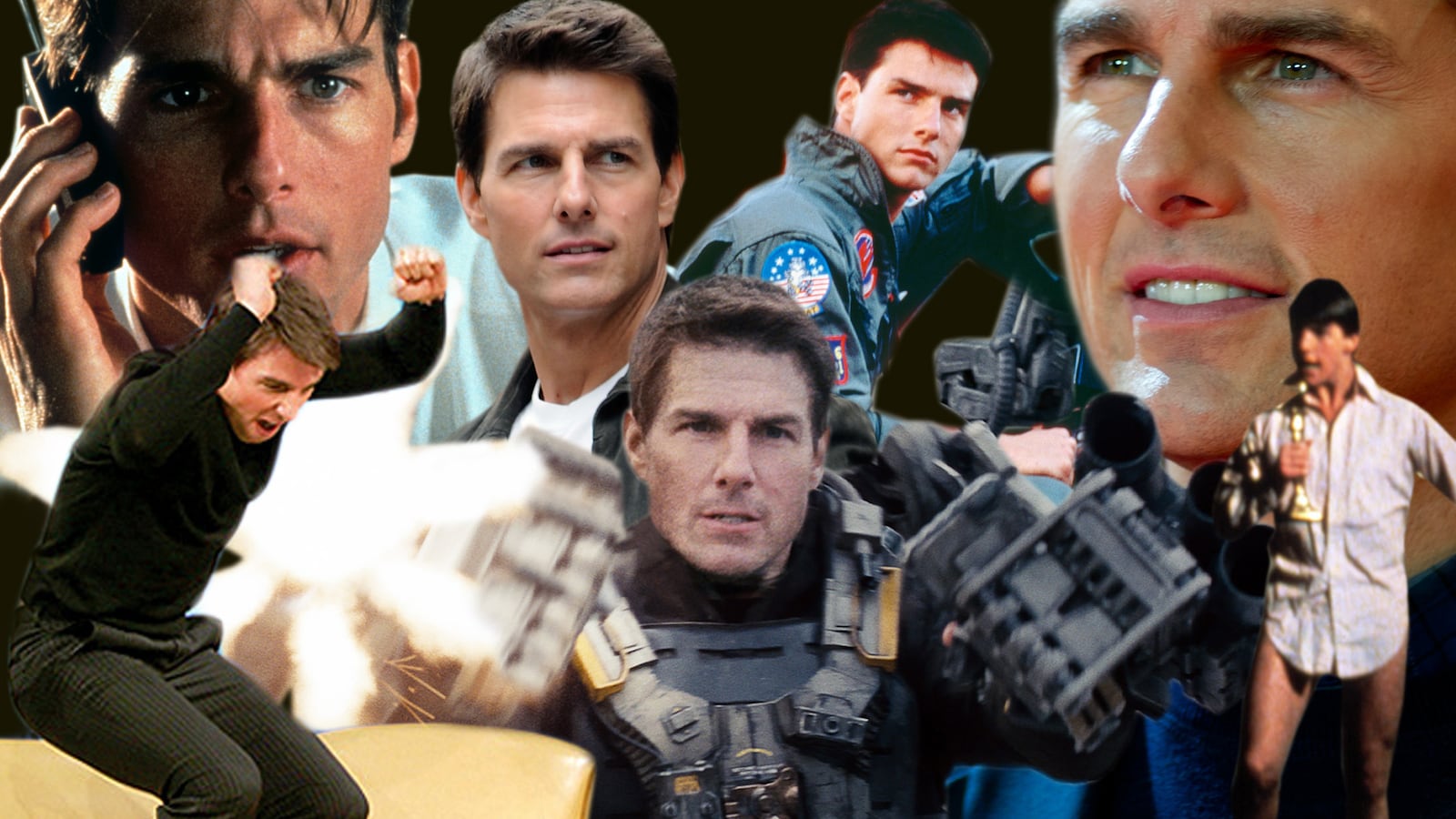First things first: The new Tom Cruise movie, Edge of Tomorrow, is outstanding.
The concept itself is clever (but never too clever). In the near future, Cruise’s character, a military PR man named William Cage, is compelled, despite his utter lack of combat experience, to fight in a D-Day-like battle against a vicious horde of whirling-dervish alien invaders—and then, after being slaughtered by the space demons, he’s propelled into some sort of Groundhog Day time loop that forces him to relive the day of the battle again and again every time he dies.

The director, Doug Liman, is at the top of his game—no small feat for a filmmaker whose other credits include Swingers and The Bourne Identity.
Cruise’s co-stars—Emily Blunt as kick-ass Special Forces soldier Rita “Full Metal Bitch” Vrataski; Bill Paxton as hard-ass Master Sergeant Farrell Bartolome—are as funny and forceful as they’ve ever been.
And then there’s Cruise, who leavens his trademark intensity with a disarming sense of vulnerability and delivers his finest leading-man performance in 10 years.
As I said, outstanding. And yet nobody seems to care.
Edge of Tomorrow arrives in U.S. theaters on June 6, but to get out in front of the World Cup, Warner Bros. launched it overseas last week. The numbers were discouraging. All told, the movie raked in $20 million from 28 international markets—a mere fifth of Angelina Jolie’s Maleficent tally. Its domestic receipts aren’t expected to be much better. Beset by what Variety called “a worrisome lack of buzz,” Cruise’s $178 million tentpole is on track to make $30 million its opening weekend— “a paltry figure for such an expensive film.” As Variety put it, “Edge of Tomorrow may be one of the summer’s first big bombs based on the lack of enthusiasm by U.S. audiences.”
My mom’s reaction to the trailer pretty much sums it up. “Hmm,” she said. “Looks just like that other Tom Cruise movie.”
Not long ago, Cruise was the biggest star on the planet. His films have earned in excess of $8 billion worldwide; 17 of them have grossed more than $100 million in the United States, and 20 have grossed more than $200 million globally. But since 2005, the year he shamed Brooke Shields for taking Paxil and mounted Oprah’s couch to declare his love for Katie Holmes, Cruise’s box-office clout has waned. None of his last four original films—Valkyrie (2008), Knight and Day (2010), Jack Reacher (2012), or Oblivion (2013)—cleared the $100 million mark in North America, and his public image has never quite recovered from the Scientology-fueled damage it sustained in the mid-Aughties.
Which raises an important question: If no one bothers to go see a legend like Tom Cruise in a movie as good as Edge of Tomorrow, does that mean the guy has lost his mojo for good? Or is there a way—maybe, just maybe—for him to get it back?
Call me an optimist (or just a Cruise apologist) but I don’t think Mr. Mapother should be written off just yet. I certainly don’t want him to be. Whatever you think of his personal life and religious beliefs, the truth is, Cruise is an endangered species in Hollywood today: an actor with the charisma and chops to carry a film; a leading man you can’t look away from; a real live movie star.
For much of Hollywood history, stars like Cruise were the coin of the realm; now the industry has stopped minting new models. As recently as the 1990s—and I’ve written about this before—moviegoers generally agreed on what they liked to watch: certain actors, certain genres, certain formulas. But the Internet killed the monoculture. Today, everyone is a demographic; everything is a niche.
As a result, young viewers who came of age after the decline and fall of the monoculture don’t have the same attachment to individual movie stars as their predecessors, which is why none of the recent Next Big Things—Taylor Kitsch, Henry Cavill, Chris Pine, Chris Hemsworth, Chris Evans, and so on—have really become old-fashioned box-office draws in and of themselves. Instead, Hollywood uses these post-monoculture male leads almost interchangeably—as figurines dropped into “a superhero film, franchise-starter, or sci-fi blockbuster where concept and brand outshine the leading man”—because for young viewers, concepts and brands carry far more weight than marquee names. Superman puts 18-year-old bodies in seats. Henry Cavill does not. So once Tom Cruise is gone, there won’t be anyone big enough to follow in his footsteps. He’s the last samurai.
That’s why I’m rooting for Cruise to save himself—to stay relevant as long as possible. And I have some ideas for how he might do it.
Cruise has two problems right now. The first is that he’s lost women. Blame his creepy sci-fi religion. Blame the creepy stories about how his creepy sci-fi religion helped him creepily “audition” various starlets for the role of Mrs. Tom Cruise. Blame the Brooke Shields flap; mothers tend to take offense when you call them “misguided” for treating their own postpartum depression. Whatever the reason, Cruise’s female fan base—the demographic that made him a star in the first place—has basically pulled a Katie Holmes and filed for divorce.
Cruise’s second problem is that today’s Hollywood is hopelessly addicted to pricey tentpole pictures. Since the turn of the century, mid-budget studio films—the smart, modest movies (A Few Good Men, Jerry Maguire, Rain Man) on which Cruise built his career—have largely vanished from the earth.
In response, Cruise has spent the last decade or so playing defense. Either he’s trying to appeal mainly to male audiences with big sci-fi, action, or historical tentpoles in which his female love interests are often absent or irrelevant (War of the Worlds, Valkyrie, Collateral, Jack Reacher, Mission Impossible: Ghost Protocol), or he’s apologizing to the rest of us for his sanctimonious, self-serious, overenthusiastic real-life exploits by “proving” that he too can laugh at Tom Cruise (Tropic Thunder, Rock of Ages). The returns are clearly diminishing, and the pattern can get repetitive: Edge of Tomorrow, for example, is the second Cruise vehicle in a row (after Oblivion) that’s about a futuristic war between aliens and humans. (Hence my mother’s comment.)
What Cruise hasn’t been doing is playing to his strengths. The conventional wisdom is that confidence, even arrogance, is his signature asset as an actor—a quality the critic David Thomson has called “Cruise control” and described as the “cocksure attitude that once wrapped up the lad in his own daft grin.” Think of the scene in Cocktail when Cruise is spinning shakers like a barroom acrobat, or the one in Top Gun when he tells Kelly McGillis about his “inverted” run-in with a MiG. The squaline nose, the predatory squint, the overbearing smile: this was Cruise as Ronald Reagan’s bumptious grandson—the brash embodiment of go-go 1980s American exceptionalism.
But that was never Cruise at his best, and the remarkable thing about him was that he knew it. From the beginning, he was a professional: an actor who (like Clark Gable or Cary Grant) understood what about him was star-worthy and who picked his projects accordingly. And so again and again he pitted his own radiant confidence against some equal and opposite force. Paul Newman in The Color of Money. Dustin Hoffman in Rain Man. Jack Nicholson in A Few Good Men. Vietnam in Born on the Fourth of July. Money in The Firm. Daddy issues in Magnolia. Financial ruin in Jerry Maguire.
After The Outsiders, Cruise ran away from the Brat Pack. (“I want no part of that,” he told Playboy in 1986. “Putting me in there is absolutely absurd, and it pisses me off because I work hard and then some guy just slaps me together with everybody else.”) He refused to make action movies for the first 15 years of his career. (“I’d been offered a lot of different kinds of action movies, but nothing really interested me,” he explained to Boxoffice magazine in 1996. “I thought I’d seen it before.”) And he was always willing to play second fiddle—to learn from, and link himself to, the old-fashioned, serious actors he hoped to emulate. (“When I get to be Newman’s age, I’m looking to still be playing the great characters he plays,” Cruise said in his first cover story, for Interview.)
In short, Cruise knew that his personality would only become a screen persona—that his natural confidence would only connect; that Thomas Mapother IV would only become Tom Cruise—if his characters had to face failure. David Thomson, as usual, gets it exactly right. “He and we have been misled in trying [Cruise] on as a hero, a kind of superman,” he recently wrote. “He is a small fellow, a natural chump, in all likelihood brave, persevering and patient, but getting dumped on…It’s when Cruise lived in triumph that he became insufferable, and stopped making progress as an actor.”
So what should Cruise do now? Ironically, Edge of Tomorrow is the perfect part for him in many ways. His Major William Cage is a very small fellow indeed: an unctuous coward who tries to weasel out of combat by blackmailing a general, then spends the rest of the movie failing, again and again, to save the world. The genius of the time-loop conceit is that Cage’s inevitable transformation from bumbling nincompoop to robot-suited savior feels totally human (and not at all superheroic) because we see, every time he dies and the day resets, how difficult it is for him to succeed. Cruise has always been a hard worker; here, he stops trying to make it look easy and lets his inherent industriousness enliven the role instead.
The problem, of course, is that Edge of Tomorrow is yet another sci-fi tentpole picture, and audiences feel like they’ve seen it all before. The only way that Cruise will get our attention at this point—the only way he will convince anyone, especially women, to give him a second chance—is if he does something drastically different. Something courageous. Maybe it’s an intimate, romantic feature (like Her). Maybe it’s a solo tour de force (like All Is Lost). Maybe it’s an intellectual puzzler (like Memento). I’m not exactly sure. All I know is that who Cruise actually is now—a guy who is alone in the world, who is failing at work, and whose confidence is being challenged everywhere he turns—is who he should be playing, in some sense, on screen. Living in triumph is a young man’s game, and Cruise, now 51, was never that great at it anyway.
The good news is that Cruise has never been short on courage. He’s the star who, at the height of his fame, chose to make an eerie film about sexual yearning with Stanley Kubrick—and his then-wife Nicole Kidman. He’s the star who got a visceral anti-Vietnam epic by Oliver Stone greenlighted after 11 years in development hell. He’s the star who accepted Paul Thomas Anderson’s implicit challenge to play a hysterical version of himself.
Here’s hoping, then, that Cruise can summon up that courage once again—and remind Hollywood what a real movie star can be.






